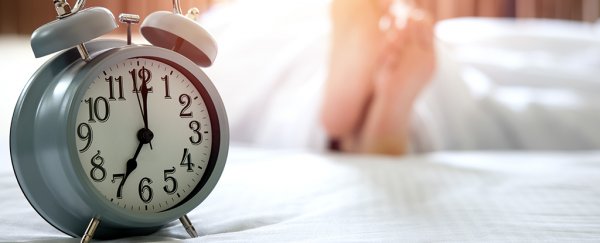It's well known that getting enough sleep is vital for staying healthy, but excessive snoozing looks to be linked to a higher risk of heart problems and even a higher mortality risk, according to new research.
That's not to say too much sleeping will directly kill you – but if you're spending a long time in bed it could be a sign or a symptom of an underlying health problem, or there's a chance it could be making existing issues worse.
Now a team of researchers says we should pay more attention to oversleeping: cutting it down to the recommended seven to eight hours a night might end up significantly reducing the risk of health problems later in life, they say.
"Our findings have important implications as clinicians should have greater consideration for exploring sleep duration and quality during consultations," says one of the team, Chun Shing Kwok.
"If excessive sleep patterns are found, particularly prolonged durations of eight hours or more, then clinicians should consider screening for adverse cardiovascular risk factors and obstructive sleep apnea, which is a serious sleep disorder that occurs when a person's breathing is interrupted during sleep."
In other words, if doctors find their patients are spending a lot of time sleeping, that could be something worth looking into – particularly if the sleep isn't refreshing.
The researchers analysed 74 previous studies that logged self-reported sleep duration and quality, as well as mortality and cardiovascular health. In total, the studies covered more than 3 million participants.
They found that an average sleep duration of 10 hours a night is linked with a 30 percent increase of premature death compared to getting seven hours a night.
An average of 10 hours of sleep also equated to a 56 percent increase in stroke mortality risk, and a 49 percent increase in cardiovascular disease mortality risk. Meanwhile, poor sleep quality was linked to a 44 percent increase in coronary heart disease rates.
Even across 3 million people, the study does have some limitations: sleep habits were self-reported rather than measured in a lab, so may not be fully accurate. Plus, there might be underlying physical or mental conditions, not recorded in the studies, that had an effect on sleep patterns or risk patterns.
As a result, the researchers can't say more than eight hours of sleep sleep causes an early death – just that it's something we should be watching out for as a potential warning sign.
Ultimately, there are so many different factors that affect sleep – from work patterns to kids to the 24-hour nature of today's society – that we're going to be exploring the implications for our health for a long time to come.
In the meantime, try and aim for that magic seven-to-eight hours of sleep (although it depends on your age, of course). And if you feel like you need to lie in on the weekend sometimes, well science says that's fine too.
"Sleep affects everyone," says Kwok. "The amount and quality of our sleep is complex."
The research has been published in the Journal of the American Heart Association.
